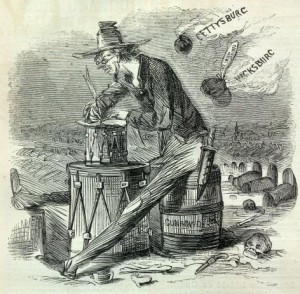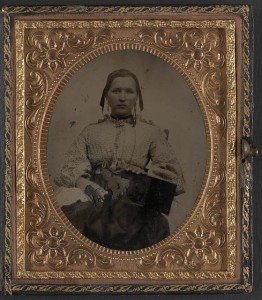On June 28, 1863 the Confederacy’s president, Jefferson Davis, wrote, “If a victim would secure the success of our cause, I would freely offer myself.”[1] Since that was unlikely to work out, 150 years ago today President Davis proclaimed pardon and amnesty to deserters who would return to the army. The numbers were needed as the Yankees massed their hundreds of thousands to subjugate, plunder and incite servile insurrection.
From the Richmond Daily Dispatch August 3, 1863:
To the soldiers of the Confederate States.
After more than two years of a warfare scarce by equalled in the number, magnitude, and fearful car[n]age of its battalion — a warfare in which your courage and fortitude have illustrated your country and attracted not only gratitude at home, but admiration abroad — your enemies continue a struggle in which our final triumph must be inevitable Unduly cleated [elated] with their recent successes they imagine that temporary reverses can quyout [quiet your?] spirit or shake your determination, and they are now gathering heavy masses for a general invasion in the vain hope that by a desperate effort success may at length be reached.
You know too wall, my countrymen, what they mean by success. Their malignant rage aims at nothing less than the extermination of your selves, your wives, and children. They seek to destroy what they cannot plunder. They propose as the spoils of victory that your homes shall be partitioned among the wretches whose atrocious cruelties have stamped infamy on their Government. They design to in site servile insurrection and light the fires of incendiarism whenever they can reach your homes and they debauch the inferior race hitherto docile and contented, by promising indulgence of the vilest passions as the price of treachery. Conscious of their inability to prevail by legitimate warfare not ring [willing] to make peace lest they should be hurled from their seats of power, the men who now rule in Washington refuse even to confer on the subject of putting an and to outrages which disgrace our age, or to listen to suggestion for conducting the war according to the usages of civilization.
Fellow-citizens, no alternative is left you but victory, or subjugation, slavery, and the utter ruin of yourselves. your families, and your country. The victory is within your reach. You need but strai [stretch] forth you hands to grasp it. For this and all that is necessary is that these who are called to the field by every motive that can move the human heart, should promptly repair to the post of duty, should stand by their comrades now in front of the foe and thus so strengthen the armies of the Confederacy as to ensure success. The men now absent from their posts would, if present in the field, suffice to creat[e] numerical equality between our force and that of the invaders — and when with any approach to such equality have we failed to be victorious? I believe that but few of those absent are actuated by unwillingness to serve their country; but that many have found It difficult to resist the temptation of a visit to their homes and the loved ones from whom they have been so long separated; that others have left for temporary attention to their affairs with the intention of returning and then have shrunk from the consequences of their violation of duty; that others again have is it their posts from mere restlessness and desire of change, each qui[eti]ng the upbraiding of conscience by persuading himself that his individual services could have no influence on the general result. These and other s (although far [les]s disgraceful than the desire to avoid danger, or to escape from the sacri[fice] required by patriotism) are, nevertheless, vous [your] faults, and place the cause of our beloved country; and of everything we hold dea[r], in imminent] per[il]. I repeat, that the men who now owe duty to their county who have been called out and have not yet reported for duty, or who have absented themselves from their posts are sufficient in number to [assure] us victory in the struggle now impending.
I call on you, then, [m]y countrymen, to batten to your camps, in obedience to the dictates of honor and of duty, and summon those who have absented themselves without leave, or who have remained absent beyond the period allowed by their furloughs, to repair without delay to their respective commends; and I do hereby declare that I grant a general pardon and amnesty to all officers and men within the Confederacy, now absent without leave. who shall, with the least possible delay, return to their proper posts of duty; but no excuse will be received for any delay beyond twenty days after the first publication of this proclamation in the State in which the absents may be at the date of the publication. This amnesty and pardon shall extend to all who have been accused of, or who have been convicted and are undergoing sentence for, absence without leaves of desertion, excepting only those who have been twice convicted of desertion.
Finally, I conjure my country women — the wives, mothers sisters, and daughters, of the Confederacy–to use their all powerful influences in all of this call to add one crowning sacrifice to those which their patriotism has so freely and constantly offed on their country’s alter, and to take care that no who owe service in the field shall be sheltered at home from the disgrace of having deserted their to their family to their country, and to their God.
Given under my hand, and the seal of the Confederate States, at Richmond, this 1st days of August,in the year of our Lord one thousand eight hundred and sixty three.
Jefferson Davis.
By the President:
J. P. Benjamin, Sec’y of State
The papers throughout the Confederate States are earnestly requested to publish this proclamation at the earliest moment.
The political cartoon was published in the July 25, 1863 issue of Harper’s Weekly at Son of the South
- [1]Fredriksen, John C. Civil War Almanac. New York: Checkmark Books, 2008. Print. page 268.↩


